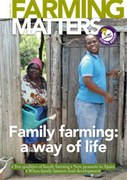Family farmers and the many ways in which they contribute to food security, healthy landscapes and thriving rural communities can be supported in a number of ways. These are some initiatives from around the world.
Nepal
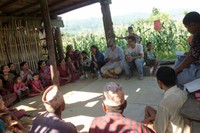
In Nepal’s patriarchal society, particularly in rural areas, discrimination of women is still very much part and parcel of daily life. Yet farming families can only generate sustainable livelihoods when there is gender equity and equality. This is why the Women’s Rehabilitation Centre (WOREC Nepal) continuously advocates for the economic, social and cultural rights of women at the community and national levels. Through support programmes for women as well as trainings for women, youth and men, WOREC Nepal helps develop rural women’s leadership capacities and increases their participation in decision making in the household and on the farm. WOREC has been working with women in the Udayapur district, who have now established their own active farmer groups and community organisations, and have started talking about gender equality and equity, women’s rights and participation in decision making. WOREC has also helped to develop a participatory extension mechanism through local community based organisations of women and other marginalised people, where they actively participate in agricultural development. WOREC’s work is in unique in the region, as it focuses on gender and empowering marginalised people in violence-affected communities. By working with a gender perspective, identifying the problems and needs of all family members and mobilising farmer groups, this work is helping to strengthen eco-friendly family farming in the region.
For more information contact Sabnam Rai, Agriculture Programme Officer at WOREC Nepal. E-mail: awaicha.sabnam@gmail.com
Liberia
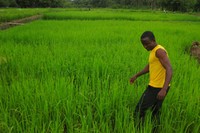
After 17 years as a bank employee Augustine Temba and his wife and children moved to their family’s farm near Monrovia just before Liberia’s civil war started. Liberia is one of Africa’s most food-insecure countries. The war left the country’s physical infrastructure in tatters, meaning it was very difficult to make any return on distributing or selling food. Despite low profits, Augustine and his family have continued farming, because the future of their community depends on it. The rebel troops came in 1990 and took everything from the farm. But the Tembas didn’t leave. The farm was a safety net and Augustine knew if they continued to grow rice, they would always have food. His children began to see farming in a new light. “All around us people went hungry. We realised just how important agriculture is for the wider population,” says one. When humanitarian aid arrived, they recognised the Temba farm as a viable source of rice, trading rice for bags of wheat. The children helped move the food to refugee camps in exchange for other commodities. The family farm was more than a business, the farm was survival. And this is still the case now that peace has returned to the country. The USAID Food and Enterprise Development Programme began supporting the Temba farm in early 2013, establishing a community project with 35 neighbouring families. By supporting the Temba family and other family farms, the programme builds on the strength and resilience of Liberia’s own farmers and promotes food security in the country.
For more information contact Nicholas Parkinson at USAID. E-mail: nico.parco@gmail.com
Kenya
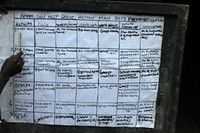
In Kenya’s western county of Siaya, family farmers are putting agro-ecological knowledge at the heart of their communities. With Peer to Peer (P2P) training, farmers learn from each other in a way that empowers them to use their skills to innovate and to adapt techniques and ideas to their local context. Family farmers first participate in a two-week intensive course on agro-ecological techniques, gender, social development and the environment, conducted by the initiative Send a Cow. At the heart of the course are soft skills rather than technical abilities, such as listening, communication, resourcefulness, humbleness, and flexibility. After this, the participants return to their community to train their peers, where their newly acquired skills contribute towards building agro-ecological practices that fit with the reality of family farmers in their particular community and environment. This enables farmers in the community to build knowledge together with a trainer from their own community, one whom they trust, who is accessible and can demonstrate the techniques in his or her own fields. By putting a permanent source of knowledge into the community, the approach supports farmers to confidently lead the change they want to see. Using peers to catalyse this change is a promising approach that has not been much used before. It could greatly contribute to the prosperity of agro-ecological family farming and its attractiveness for future generations.
For more information contact Martin Vieira, Policy Executive at Send a Cow. E-mail: Martin.Vieira@sendacow.org.uk
Guatemala
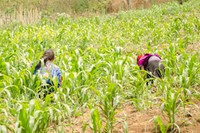
Responding to increasing climate change risks, Mayan families in Tzununá in the department of Solola, Guatemala, have developed food diversification strategies by managing family gardens. These gardens have been maintained by rural households for centuries. But the multifunctional gardens provide families with more than just food. The variety of species have many uses, including medicine, construction and craft materials, shade, fuel, recreation, fodder and drinks. This type of farming helps families with limited access to land to improve their food and nutrition security by diversifying their production, increasing their incomes, and providing them with a number of environmental services, such as water and waste recycling, protecting soil against erosion, and maintaining or increasing local biodiversity. In addition, family gardens can be a place for innovation and learning. They function as open classrooms or living laboratories, where learning-by-doing (in small but significant moments) can encourage families and their neighbours to improve their production practices every day. The analysis of 24 gardens in four Mayan Kaqchiquel communities in Tzununá revealed that women are primarily responsible for the management of family gardens in the community and are often the sole caretakers of these agro-ecosystems. In such a way, garden agriculture increases women’s autonomy and decision-making opportunities. All these attributes give Mayan family gardens the potential to be more adaptive to climate change.
For more information contact Henry Ruiz Solsol at the Tropical Agricultural Research and Higher Education Centre (CATIE). E-mail: hruiz@catie.ac.cr

